Institutions
After giving us some personal information in the survey such as their institutional affiliations, the experts were asked the following question, “On a scale of 1-10 with 1 representing no change and 10 representing radical change, please indicate how much change you think the internet will bring to the following institutions or activities in the next decade.” News organizations and publishing were the most popular choice for radical change; religion was seen as the least likely to change because of the internet.
Experts were then asked to write responses to this statement: “In the next decade, which institutions and human endeavors will change the most because of the internet? Tell us how you see the future unfolding or point us to your favorite recent statement about the impact of the internet in the future.”
An extended rundown of the written answers to this question can be found at: http://www.elon.edu/predictions/q7.aspx.
News organizations and publishing
- Mean score: 8.46 on a 10-point scale (1=no change; 10=radical change)
It is safe to say that many of the experts here have direct connections to news organizations (if only as consumers) and publishing enterprises. Thus, it is not surprising to find that many were speaking from personal experiences as they assessed the evolution of the media environment.
One expert wrote, “The most obvious effects on news media are the rise of weblogs supplanting the public’s attentions to traditional news media, and the slow death of newspapers due to erosion of mindshare by online influences such as news Web sites, chat rooms, message boards and online gaming.”
James Brancheau, a vice president at GartnerG2 who analyzes the media industry, wrote, “Connections across media, entertainment, advertising, and commerce will become stronger with future margins going to a new breed of ‘digital media titans.’ These companies may not come from the traditional value chain, they will be far more aggressive than existing players. The incumbents are not moving fast enough. Well-branded innovators such as Google and Starbucks have a chance to build all-new new distribution models tied to ad revenue and retail sales.”
Education
- Mean score: 7.98 on a 10-point scale (1=no change; 10=radical change)
[competency-based training]
Workplaces
- Mean score: 7.84 on a 10-point scale (1=no change; 10=radical change)
[information and communications technology]
Medicine and health care
- Mean score: 7.63 on a 10-point scale (1=no change; 10=radical change)
Daniel Z. Sands, a primary care internist, assistant professor of medicine at Harvard Medical School and chief medical officer of ZixCorp, wrote: “The internet is changing healthcare in many ways: It changes the way clinicians communicate with one another, including consultation specialties. It transforms the way patients and providers access and share information. It lowers barriers of the paper world, making it possible to patients to see their records online and be more involved in their health care. It offers additional channels through which care can be delivered to patients. Because of this, it will force new models of licensing health care professionals, to permit us to deliver care at a distance. It will also force us to change the way clinicians are remunerated, to include non-visit based care. The internet will increasingly change patients’ expectations of the clinicians, so that physicians will routinely need to offer services like e-messaging, instant messaging, video conferencing and other online services.”
Charles M. Firestone, executive director of the Aspen Institute, wrote, “I think public health has the potential to change the most with the widespread dissemination of public health information via the internet (and eventually to the mass media), the earlier detection of the spread of communicable diseases, and the ability to treat people remotely – all increasing significantly in the next decade.”
Ted Eytan, medical director of the Web site for Group Health Cooperative, wrote, “Health care is approximately 10 years behind other endeavors in being transformed, and will experience its boom in the next 10 years. Consumers can now clearly see the differentiation between what they can get online from their health care organization (little to nothing) and from other institutions, and will demand parity. This will serve to overcome current financial barriers to provide e-health services. We will move from patient-physician e-mail to complete medical record transparency, and ultimately a true sharing of the health care experience and the accountability for the diagnosis and therapy between physician and patient. A recent statement of mine is ‘2003 was the year of the secure message, 2004 is the year of the online lab result.’”
Politics and government
- Mean score: 7.39 on a 10-point scale (1=no change; 10=radical change)
One expert wrote, “Government will be forced to become increasingly transparent, accessible over the Net, and almost impenetrable if you’re not on the Net.”
Music, literature, drama, film and the arts
- Mean score: 7.18 on a 10-point scale (1=no change; 10=radical change)
One expert wrote, “Digitization and the Internet make for a potent brew. Look for continued disruptive change from the new reality of digital photography, digital music, digital video, digital ‘film’-making, digital television, digital news, digital books, etc. TiVo kills the commercial television format. Napster, Kazaa, and iPod kill the ‘album’ format. In the future, everyone will be famous for fifteen minutes in their own reality show.”
Another wrote, “The area that will change the most will be arts and entertainment. The ability to receive real-time music and video over the internet, or downloaded content, will radically transform business models for TV and movies as it is already doing for music. It also will continue to change the relation of the public to artists as it has through fan sites, remixes, and other internet-based phenomena.”
International relations
- Mean score: 6.74 on a 10-point scale (1=no change; 10=radical change)
One expert wrote, “The internet increases options and possibilities. It connects people to each other and increasingly things to each other. The world will get a nervous system, and that is a big deal.”
Another wrote, “After spending 3 months in rural South East Asia this year I think the most interesting developments that will come from the internet will be from the developing nations. We will see this in every category from virus writing, to online gaming, to offshore tech support and coding. I think the internet will be become increasingly less English language centric.”
Military
- Mean score: 6.53 on a 10-point scale (1=no change; 10=radical change)
One expert wrote, “The military will obviously continue to develop internet related technologies, mostly those of surveillance (except they may call them homeland security or privacy protection).”
Families
- Mean score: 6.24 on a 10-point scale (1=no change; 10=radical change)
Michael Botein, director of the Communications Media Center at New York Law School, wrote, “Families, friends, and colleagues hang together much more through the Internet than through the lost art of written correspondence or voice – as seen by the fact that my adult children answer emails immediately and phone messages in a week (if at all).”
Another expert wrote, “The context for family interactions has already changed dramatically. The ease with which children and grandparents can communicate; the ability to message instantly will change the nature of our interfamily relations – and thereby change the dynamics of our personal lives.”
Neighborhoods and communities
- Mean score: 6.16 on a 10-point scale (1=no change; 10=radical change)
Barry Wellman, head of Netlab at the Centre for Urban and Community Studies and the Department of Sociology at the University of Toronto, wrote, “A move towards networked individualism and away from groups – in work, community and even the family.”
Mike Kelly, president of AOL Media Networks, wrote, “As broadband proliferates the access to information, services and applications by households and institutions with relationships to households (schools, communities, governments, marketers) will deliver on the promise of the internet as a personal productivity tool as well as a communications/information resource.”
Religion
- Mean score: 4.69 on a 10-point scale (1=no change; 10=radical change)
Jordi Barrat i Esteve, of the Electronic Voting Observatory at Universitat Rovira i Virgili, wrote, “The institutions strongly based on information exchange, like international politics, education, arts or media, will change the most because the internet is directly linked with the information management. On the other hand, religion is above all a personal field and the internet is here a tool with less influence.”
None of the above, all of the above
There were quite a few experts whose comments could not be sorted into a specific category.
Peter M. Shane, professor of law at Ohio State University and the editor of Democracy Online, wrote, “The most radical changes will likely involve the workplace, because of the economic incentives involved, and processes of artistic creation, because the internet is such a fabulous new medium of creation and distribution. I hope for real, but more modest gains in the contribution of the internet to our democratic life.”
“Hyperlinks subvert hierarchy. The Net will wear away institutions that have forgotten how to sound human and how to engage in conversation.”
– David Weinberger, a fellow at Harvard’s Berkman Institute for Internet & Society and blogger extraordinaire
Gary Chapman, director of the 21st Century Project at the Lyndon B. Johnson School of Public Affairs at the University of Texas at Austin, wrote, “Nearly everything will change because of the internet, and especially as the internet becomes ubiquitous and all-pervasive, different from the discrete experience it is now on a computer. The ‘always-on’ internet, combined with computers talking to computers, will be a more profound transformation of society than what we’ve seen so far.”
Douglas Rushkoff, an author and professor at the New York University Interactive Telecommunications Program, wrote, “The biggest changes, as always with new media, will be metaphorical. It’s not that anything in particular that we do on the internet is so important – it’s that behaviors we have online can serve as models for behaviors that change in real life.”
Bob Metcalfe, inventor of ethernet and founder of 3Com, wrote, “Governments will tend toward democracy. Transportation will be refined through massive substitution of communication. The current flight to cities will be reversed. The Internet won’t be in schools, it will replace schools. Television channels will be replaced by video blogs and Dan Rather will be dragged off the set.”13
Peter Denning, a computer science pioneer, wrote, “Greater use of open development processes for technology, as in the World Wide Web Consortium or the Internet Engineering Task Force. Greater separation of people from direct social interaction, leading to decreasing skill in social interaction and more social and organizational problems. Greater offloading of work tasks from organizations to their customers (e.g., do-it-yourself Web sites) with less and less human help or customer service available.”
Bill Eager, an internet marketing pioneer, wrote, “We already know that the internet ‘connects’ the world. We have been largely wired. Now we are at the point where applications will mushroom for individuals and organizations. In particular individuals will have 24/7 access to communications, education and information with the proliferation of a new generation of small, portable, wireless access tools. Full integration of voice recognition will make the internet both accessible to a larger audience and considerably more human friendly.”
“Anything that has involved an intermediary will be changed. New kinds of intermediaries will emerge, but the old ones – especially in businesses that have created high margins by being in the middle of transactions – will find their very existences at risk.”
– Dan Gillmor, longtime technology journalist
Rose Vines, a technology journalist, wrote, “The next decade should see the development of a more thoughtful internet. We’ve had the blood rush to the head, we’ve had the hangover from that blood rush; this next decade is the rethink. Because of that, we’ll start to see developments which reflect real human needs: For connection, for privacy, for security, for a sense of belonging. We’ll probably also see more attempts at control of the internet, both by business and governments around the world.”
Bill Warren, vice president of Public Affairs & Community Relations at Walt Disney World Company, wrote, “My window on the internet is most clear as I watch my children effortlessly roam around the world via the Web. It has already taken them farther than I – as a parent – will ever be able to take them. It’s making the world a smaller place, and forever expanding my children’s horizons. For that, I am both amazed and grateful.”
Gary Arlen, a communications and media consultant, wrote, “Global communications and the ability to find and identify ideas. Education will be greatly affected, although this depends on financial/funding and policy decisions. Entertainment will continue to drive access, with new forms of digital interactive games and content arising thanks to the capability of the Internet’s connectivity and graphics power. Videophony (video phones) for a variety of business and social uses will be an add-on to the coming VoIP onslaught.”
Challenges to the question
We invited experts to challenge the premise of the questions being asked of them. One example of an interesting challenge to this question about the institutional impact of the internet was this: “Although I have tried to adapt my thinking to this questionnaire and to indicate how much I think each sector will employ the internet, ‘how much change you think the internet will bring’ does not describe the way that the internet or society works. The internet does not ‘bring’ change. The internet is shaped and developed by these sectors; it is not exogenous to them!”
Philip Virgo, secretary general of the European Information Society Group, wrote, “It will take several years for the players to get their acts together and re-engineer mass-market access products and services for reliable and safe use by ordinary human beings. It will then take several more years to overcome the growing backlash. Radical change will therefore only begin to happen towards the end of the decade. It need not be that way but the current state of denial is that it looks as though it may. P.S. One of my uncles had a mobile office in the early 1950s (World War 2 army surplus wireless equipment) and I was using non-internet e-mail (IP Sharp time-sharing service) in 1977. The pace of change to date has been greatly exaggerated.”
Negative impacts
A few experts went against the grain and predicted that the world would not necessarily be better off because of the internet.
One expert wrote, “The dissemination of information will increasingly become the dissemination of drivel. As more and more ‘data’ is posted on the internet, there will be increasingly less ‘information’…This will affect everything from politics, to science/pseudoscience, to education. The only vestige of hope may be in the development of integrity, whether mandated by law, developed by private labels, or in the most unlikely of scenarios, the nascence of personal integrity.”
Another wrote, “The internet won’t change most institutions and human endeavors too much, because it’s increasingly a cesspool of spam, porn, phishing, and other distracting and annoying commodities, discouraging more intensive and productive use.” A third expert wrote, “The largest impact will be negative: terrorist groups will figure out how to use (and disable) the internet, with grim consequences.” Finally, one respondent wrote, “The digital divide will further divide the haves from the have-nots. Even as stationary terminals are being made available in public places, so are the main uses of the internet moving to high bandwidth portable devices.”
Social networks
Prediction: By 2014 use of the internet will increase the size of people’s social networks far beyond what has traditionally been the case. This will enhance trust in society, as people have a wider range of sources from which to discover and verify information about job opportunities, personal services, common interests, and products.
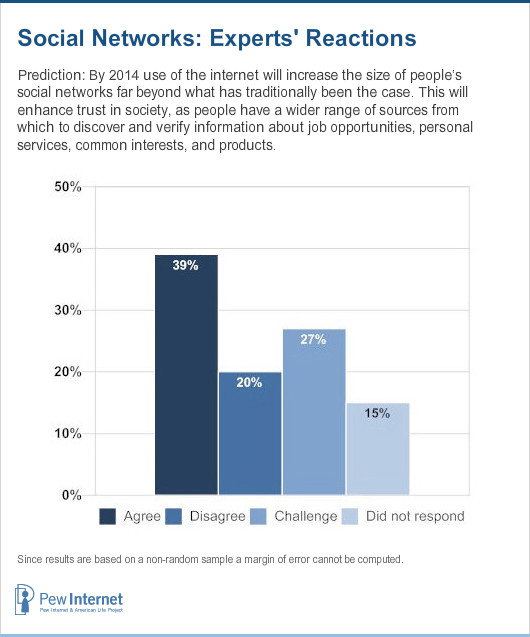
Note: An extended rundown of the written answers to this question can be found at: http://www.elon.edu/predictions/q8.aspx
A majority of those who responded to this question have serious doubts whether people can really handle larger social networks, whether those networks will be meaningful even if they do expand, and even about the virtues of expanded networks.
Early in the history of the internet, the first big mailing list on science fiction was created and users’ online conversations turned from shared research to shared interests. Any sense of idyll was quickly broken, however, by the first off-topic and unsolicited messages, later dubbed “spam.”14 Perhaps this pattern of connection and intrusion inspired the mixed reactions to this prediction about the power of online social networks – very few experts agreed with this statement without qualifications. Many respondents agreed with the first sentence of the prediction, but thought the second sentence “did not follow,” was “too general a claim,” or even was “a horrible generalization” that focused on the tech elite in the United States.
Problems with online security and privacy were mentioned quite often as a deterrent to increased trust in society inspired by the internet. One expert wrote, “I agree that social networks will be larger, but I do not believe that trust will be increased, because the internet will also bring spam, phishing, worms, and rumor mongering which will mitigate against increased trust.”
A few experts observed that expanded online networks of trusted commercial contacts have benefited many people, but social networks may not reap the same benefits. One wrote, “Although we have begun to overcome some of the trust issues concerning transactions on the internet, we are not there yet relative to social interactions. That will take more time. The internet has not replaced the handshake.” Another wrote, “Trusting the seller in eBay creates a particular bond in a particular context, but won’t necessarily extend to other areas of trust – particularly between institutions and individuals.”
Many were skeptical about the value of an expanded social network. One expert wrote that the internet “may increase the number of casual acquaintances, but not deep attachments.” Ben Compaine, a consultant for the MIT Program on Internet and Telecoms Convergence, wrote, “People will have a wider range of sources – but most individuals will settle on a small number that they will use repeatedly – much as they use a small subset of the large number of TV networks available already. Impact on trust could go either way (or both) – more sources could equal more differences of info could lead to more confusion and skepticism as easily as more trust.”
“You’ll get more information, but much of it will be contradictory.”
– Jonathan Band, an attorney specializing in e-commerce and intellectual property with Morrison and Foerster LLP in Washington
One expert tried to place this in a larger context by writing, “Like any other mass aggregation of people, peddlers of wares and services, hucksters of all descriptions, and general riff raff will make these larger social networks somewhat less than useful. There will be (and are) benefits, however, for those who can tolerate the virtually milling masses. For example, the internet is great at aggregating individuals without regard to distance, for example those who are offering a good or service and those who wish to buy, or patients with rare diseases.”
Dan Froomkin, a columnist for washingtonpost.com and deputy editor of niemanwatchdog.org, wrote, “The key will be for the internet to embrace geography considerably more than it has thus far. More Friendsters, and less Freepers. More craigslist and less eBay. The internet could be a tool for people to connect with each other in their geographic communities, not withdraw from their geographic communities into a virtual space where the horizons are vastly narrower.”
Noshir Contractor, a researcher for the National Science Foundation and speech and communications professor at the University of Illinois-Urbana-Champaign, wrote, “It will increase the size of people’s ‘latent’ social networks. They will have access to more of their direct and indirect contacts and greater ability to find out who knows who, who knows what, who knows who knows who, who knows who knows what.”
Network infrastructure
Prediction: At least one devastating attack will occur in the next 10 years on the networked information infrastructure or the country’s power grid.
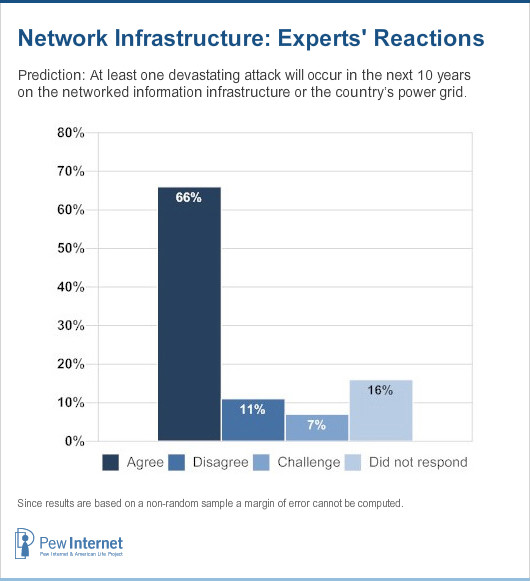
Note: An extended rundown of the written answers to this question can be found at: http://www.elon.edu/predictions/q9.aspx
As Americans have become more dependent on the internet, there has been a growing chorus of concerns about the vulnerability of the network to physical and internal attack. Denial of service attacks have plagued some Web sites. A growing number of computer viruses have spread around the network. A central part of the internet in Manhattan was near the Sept. 11, 2001, terror attacks on the World Trade Center. And Robert Gates, the director of the CIA in the 1990s, recently said that the internet is a prime target because terrorists may perceive it as a threat to their way of life.15
“A simple scan of the growing number and growing sophistication of the viral critters already populating our networks is ample evidence of the capacity and motivation to disrupt.”
– Anonymous respondent
There was strong agreement among experts from every group in our survey that an infrastructure attack was increasingly likely. If there was anything resembling a consensus agreement in our survey this concern about threats to the internet was it.
Respondents who agreed with this prediction had several kinds of threats in mind. Some are worried about physical attacks on central parts of the internet infrastructure or cyber-terrorist exploitation of vulnerabilities in the systems of key utilities or key industries, such as banking. Others expressed concerns that the network of networks would remain vulnerable to ever-more-clever viruses, worms, Trojan horses and other packet-born techno-troubles.
At the same time, a number of experts questioned the word “devastating,” arguing, for example, that a network attack is not likely to be comparable to a disaster like a hurricane. Fred Hapgood, a professional science and technology writer, responded, “Not if ‘devastating’ means something like ‘no internet for 24 hours’. It’s way too decentralized for that.” Simson Garfinkel, an authority on computer security and columnist for Technology Review, wrote, “I’m not sure what you mean by ‘devastating.’ We see roughly one devastating attack every 6-12 months. Do you mean an attack with loss of life?” Another wrote, “If you mean very costly, yes. If you mean a failure that cascades to other segments of society, with widespread suffering or loss of life, then no.”
One self-declared optimist disagreed with the prediction and wrote, “Technology is not sitting still, and our defenses are continuously improving.” Another wrote, “Predictions like this reflect a willingness to accept a conspiracy theory of the world. I am too optimistic to agree.”
A few experts challenged the prediction. One wrote, “I believe it implies a static infrastructure that isn’t constantly being enhanced and expanded.” Another wrote bluntly, “Dumb prediction. There is likely to be a devastating attack on anything big.”
At least one expert saw a silver lining in the event of an attack, writing, “The question, though, is how we’ll weather it. Maybe it will just cause a holiday where we come, blinking, out into the sunlight for an afternoon.”
Digital products
Prediction: In 2014, it will still be the case that the vast majority of internet users will easily be able to copy and distribute digital products freely through anonymous peer-to-peer networks.
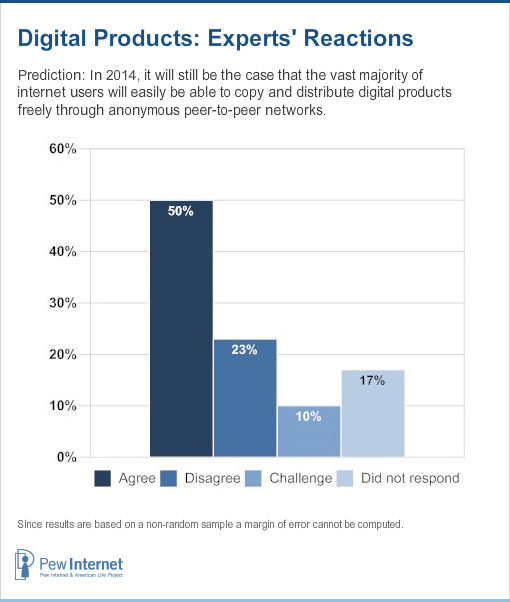
Note: An extended rundown of the written answers to this question can be found at: http://www.elon.edu/predictions/q10.aspx
The Pew Internet & American Life Project reported in January 2004 that the percentage of online Americans downloading music files on the internet plunged after the Recording Industry Association of America began filing suits in September 2003 against those suspected of copyright infringement. The number of music downloaders has rebounded to some degree in the past year. In previous research, file swappers seemed indifferent to the copyright status of the music they were sharing and downloading. But the country has gotten a crash course on copyright in the past year and a lot of people who trade files online may believe now that indifference to copyright law is a much more risky attitude.
Internet experts were divided into four different camps when it came to the future of digital property rights: philosophers, pragmatists, hacker devotees, and skeptics. Again, while it might appear from the survey data that there is solid agreement among experts on this assertion, it is more appropriate to say that the expert community is very sharply divided and uncertain about the future of shared digital products.
[children currently in elementary and secondary school]
Some experts focused on the commercial aspects of the prediction. Bob Metcalfe, inventor of ethernet and founder of 3Com, wrote, “We must and therefore will fix this problem. Private property is too valuable an economic tool.” Another expert agreed, but rather more bitterly wrote, “We’re headed towards digital prohibition. The bastards are going to win.”
Faith in technology and the ingenuity of computer programmers inspired a few experts. One wrote, “I agree because to think otherwise would mean that a draconian clampdown on the legitimate uses of the internet would have taken place. The internet is designed to allow computers to communicate directly with one another.”
“Many of the folks running the internet and its infrastructure are deeply committed to preserving this capability.”
– Anonymous respondent
A few experts foresee a two-level system. One wrote, “One will be the commercial internet where information is paid for. The other is the open source internet that is more artistic and chaotic in a positive way. We will come to associate the commercial internet with ‘credible’ and the open source internet with ‘you never know what’y’a gonna get’ though these perceptions will not necessarily align with the actual status.”
Challengers questioned the assumptions behind the prediction. Robert Lunn, a senior analyst for the USC Annenberg School’s Center for the Digital Future, confronted its parochialism: “I doubt China’s internet users are going to have that type of ‘Digital Freedom,’ and there are a lot of people in China.” Michael Wollowski, a computer scientist at the Rose-Hulman Institute of Technology, wrote, “I want to suggest that ‘freely’ would not imply ‘illegally’ in 2014.”
“[Peer-to-peer networks will] exist, but they’ll be hard to use and most people won’t bother.”
– Anonymous respondent
A few experts challenged the notion that a “vast majority” of internet users have the skills to participate in peer-to-peer networks. Eszter Hargittai, a Northwestern University professor researching the social and policy implications of information technologies, wrote, “This is not even true in 2004. Use of anon p2p networks is not as easy and as second-nature to the average user as one may think. Once we study online skills in more detail we will realize that the average user knows less than academics/journalists tend to assume.”
Civic engagement
Prediction: Civic involvement will increase substantially in the next 10 years, thanks to ever-growing use of the internet. That would include membership in groups of all kinds, including professional, social, sports, political and religious organizations – and perhaps even bowling leagues.
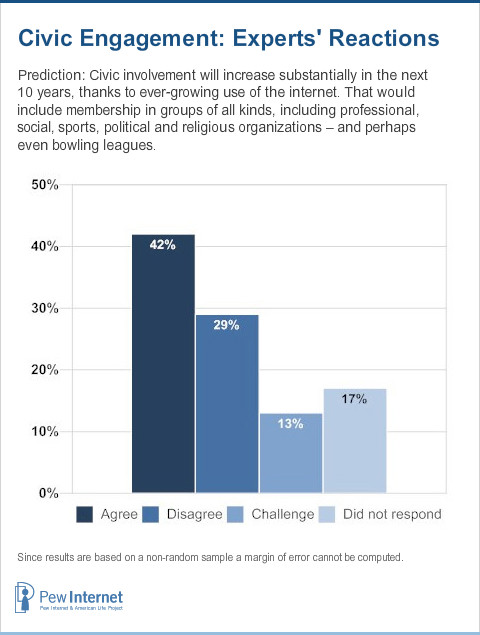
Note: An extended rundown of the written answers to this question can be found at: http://www.elon.edu/predictions/q11.aspx
In his book, Bowling Alone: The Collapse and Revival of American Community, political scientist Robert Putnam argued that one major reason for the decline in civic engagement in the United States is the reluctance among younger people to participate in community groups (bowling leagues, for example). Other social scientists express concern that internet use may prompt people to withdraw from social engagement and abandon contact with their local communities. The Pew Internet Project, however, has documented a vibrant online world where many Americans use email and the Web to intensify their connection to their local community and far-flung groups of people who share their interests.
The debate over whether the internet is helpful or harmful to civic involvement will continue for many years, judging from the reactions to this prediction. The same percentage of experts disagreed or challenged this statement as agreed with it – and even those who agreed with it often had questions about what it means.
For example, Mark Rovner, an online fundraising expert with the Carol/Trevelyan Strategy Group, wrote, “Maybe. But the memberships may be loose and ephemeral, coming together around an issue or a need at one moment, then dissolving and reforming elsewhere the next. Case in point – the Dean campaign.”
Many experts scoffed at the notion that a network of computers could increase civic participation. One wrote, “The internet is a tool, not a replacement for life. The same predictions were made about radio and television when first introduced and those latter day prophets have been forgotten, as have the historical memory of their similar predictions.” Another wrote, “The network enables greater civic involvement, but does not spawn it: a desire for change does.”
“People do not obey Moore’s Law.”16
– Anonymous respondent
Ken Jarboe, of the Athena Alliance, a Washington-DC think tank focusing on the social and economic implications of the internet, summed up many experts’ opinions about how the internet will not alleviate the time crunch: “The internet will give people a greater ability to participate – but our limited amount of time (and limited interest) will continue to be barriers to further participation. There are still only 24 hours in the day – and many, many other demands on our time.”
Other challenges to the prediction cautioned against exaggerating the internet’s impact. One expert wrote, “Ha! So much of online group ‘involvement’ is passive. Look at things like listservs. Such a small proportion of members do anything. That is not involvement. Will we be members of more groups? Sure, but that is not social involvement.” Peter Levine, deputy director of the Center for Information and Research on Civic Learning and Engagement at the University of Maryland, wrote, “Membership in disciplined, rule-based organizations will probably continue to fall. Membership in face-to-face organizations may also weaken. Counting mailing lists as ‘associations’ can be a mistake.”
“Even when some activity belongs to just 1 in a million persons, it means there are 6,000 of those people in the world. The internet allows those 6,000 people to find one another more quickly and easily.”
– Anonymous respondent
However, there are some experts who foresee a rosier outcome. Rose Vines, a technology journalist, wrote, “Involvement won’t necessarily increase in numbers, but it will in depth and richness of experience. As more groups discover ways to use the internet to connect, disseminate and influence, a new element will be added to group interaction. We’ll also see those traditionally excluded from participation, including the physically disabled and elderly, being brought on board.” Tobey Dichter, founder of Generations on Line, went even further, writing, “This is one of the most effective uses of the internet – building community. Exciting global connections will do more for international understanding and intergenerational respect than any tool since the printing press.”
Embedded networks
Prediction: As computing devices become embedded in everything from clothes to appliances to cars to phones, these networked devices will allow greater surveillance by governments and businesses. By 2014, there will be increasing numbers of arrests based on this kind of surveillance by democratic governments as well as by authoritarian regimes.
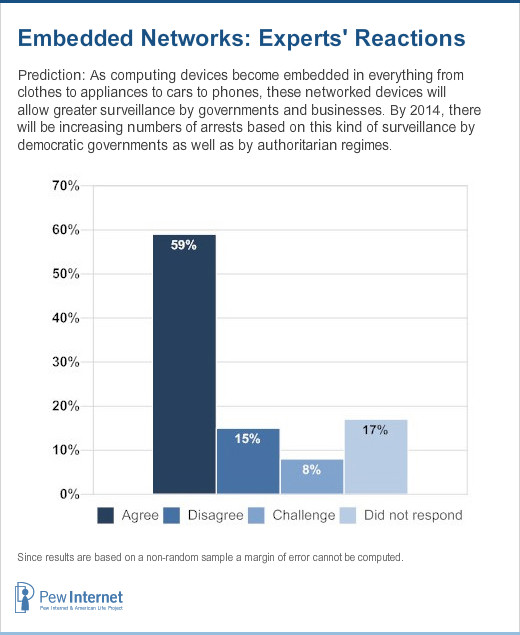
Note: An extended rundown of the written answers to this question can be found at: http://www.elon.edu/predictions/q12.aspx
There was hardly any disagreement with the assumption underlying this question: that more devices, appliances, and other objects would be tied to the information infrastructure. Proponents of automatic identification devices say convenience is one of the best outcomes of embedded technologies such as electronic toll collection, mass transit fare cards, and building access key cards. Our prediction took a different tack, eliciting fear, defiance, and hope that it might be prevented from most of the respondents.
One expert seemed to welcome the surveillance, writing, “In response to terrorism, such surveillance is necessary and predictable. Its expansion to address criminal activities is also obvious. In many cases, such as tagging pedophiles, it will bring security to the innocent and anti-social behavior can be controlled. In democracies, why worry?”
Another expert would counter that such “social surveillance” is potentially more harmful than law enforcement: “It goes far beyond arresting people. This will be a method of social control in more subtle ways, too. The risk of being seen as ‘different’ will grow, and children will grow up with the knowledge that their every move is being watched. This is a recipe for killing the kind of independent thinking that creates innovation, vibrant political debate and a free society in general.”
Susan Crawford, a law professor and policy fellow with the Center for Democracy & Technology, foresees a different consequence: “It seems to me that most of this surveillance will be private in nature, and that private firms will be unwilling to make their databases widely available. I agree there will be lots of surveillance, but I don’t see it being turned over to government authorities. Instead, it will be used to market to us in ever-more-personalized ways.”
But, as in the peer-to-peer debate, there is a group of experts who believe in the power of technology to elude the would-be watchers. One wrote, “The innovators of these tools have consistently been ahead of government efforts to counter their influence. This will continue to be so, and citizens will continue to ‘get away with’ activities using technology that government does not understand.”
Experts challenged the wording of the prediction, pointing out that it was impossible to measure. One wrote, “Since the earth’s population grows every year, ‘increasing numbers of arrests’ are inevitable. That more powerful devices will offer greater surveillance also is a given. The question is whether government will spy on us proportionately more than they do now, which, by the way, we can’t measure because it’s done secretly.”
Some experts believe the prediction will come true in less than 10 years. One pointed out, “Right now, almost no one knows what RFID means. In five years, everyone will.” (RFID stands for “radio frequency identification.” RFID tags can be as small as an adhesive sticker and can be used to automatically identify people or objects by transmitting a unique serial number.)17
The final word goes to the expert who anonymously wrote, “I would elaborate but someone might be watching.”
Formal education
Prediction: Enabled by information technologies, the pace of learning in the next decade will increasingly be set by student choices. In ten years, most students will spend at least part of their “school days” in virtual classes, grouped online with others who share their interests, mastery, and skills.
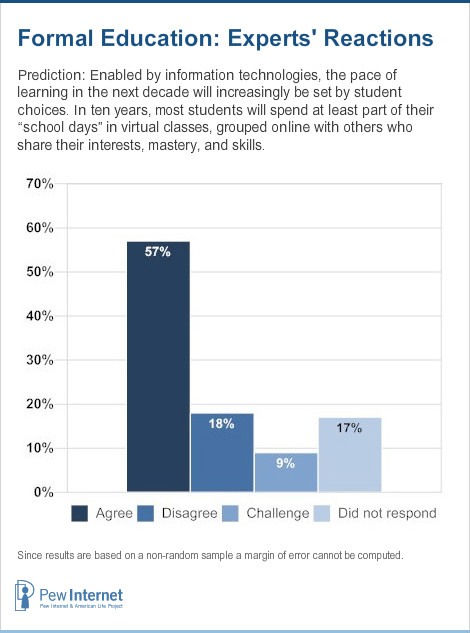
Note: An extended rundown of the written answers to this question can be found at: http://www.elon.edu/predictions/q13.aspx
There has been an aggressive national campaign to bring computers and the internet into schools – nearly all American public schools have some kind of internet access for students. However, schools with the highest concentrations of poverty are the least likely to have internet access – and access is only part of the story. Internet-savvy students are remarkably different from their non-wired peers when it comes to tackling homework, communicating with their classmates and teachers, and engaging with the outside world.
Experts cautioned that each new technology – motion pictures, radio, television, and now the internet – rekindles the hope that it will transform education for the better. Indeed, few experts agreed wholeheartedly with the prediction. The following response sums up that type of reaction: “This will transform learning as we know it. Alas, we may escape the strangulation of the agricultural calendar.” More typical was the expert who wrote, “I agree this will happen, but only in the wealthier school districts and private schools. The numerous school systems that can’t afford enough computers or adequate internet access will fall farther and farther behind.”
Many of the respondents who have had experience with teaching online said only highly motivated, mature students exhibit the ability to be successful in a learning environment in which so much responsibility is placed upon a student. Moira K. Gunn, host of public broadcasting’s Tech Nation, wrote, “I do not now, and have never, witnessed successful benefits in virtual classrooms. While the role of the teacher will change from authority figure with all the information to one-on-one educational coach, the one-teacher-one-student paradigm will remain the most effective.” Indeed, children in elementary school “still need a watchful eye and human attention,” according to one expert.
“Some students will do this, students in affluent circumstances and enlightened schools. But ‘most’ students are not so lucky.”
– Anonymous respondent
Older students – those in college, graduate school, or of non-traditional school ages – will benefit the most according to many experts, but “establishment” institutions will be the hardest to convince. Gary Bachula, a technology development leader, most recently at Internet2, wrote, “Schools and colleges are enormously resistant to this kind of change – more so than I would have predicted ten years ago. As a result, traditional methods of learning will slowly start to compete with the ‘upstarts,’ first, the ‘proprietary colleges.’ Then, one or more of the older institutions will get aggressive in this arena – and then an avalanche will occur.” Another wrote, “Harvard and other major universities are not likely to go virtual. In fact, being on campus will become a thing of status. Online learning and virtual learning will allow more individuals to go to college, but it will take decades if not centuries for online learning to gain the same status as classroom learning. I see enhanced classrooms and dorm rooms … but not a radical change in how learning occurs.”
“If people are taught to hang out only with those of like interests, mastery, and skills, they will become less tolerant of diversity. More medieval.”
– Peter Denning, a computer science pioneer
Democratic processes
Prediction: By 2014, network security concerns will be solved and more than half of American votes will be cast online, resulting in increased voter turnout.
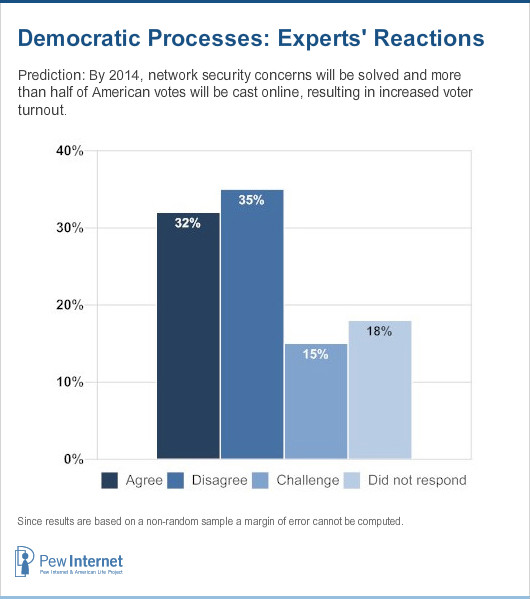
Note: An extended rundown of the written answers to this question can be found at: http://www.elon.edu/predictions/q14.aspx
It is safe to interpret these results as a clear challenge to the hope that online voting will become normalized anytime soon. The experts who disagreed or challenged this prediction articulated diverse concerns, often citing their professional expertise. Few of those who agreed with the prediction shared justifications beyond hopeful bromides like, “The sooner the better.”
Many experts sought to crush the optimistic view that network security concerns could ever be “solved.” One expert wrote, “It is foolhardy to underestimate the fragility and vulnerability of any online system to attack and manipulation. Anything that can be made secure can be hacked.”
“As long as one human being designs it, another will be able to break or hack it. This is one truism we can never lose sight of.”
– Anonymous respondent
Many experts were frustrated that the prediction mixed too many elements. One expert wrote, “Many parts to this prediction. Security concerns are unlikely to be solved and so people will not want to vote online. Even if they could, though, I do not see this resulting in increased turnout. Also, what about the digital divide? It is not going away in the next 10 years. That will suppress online turnout in many sectors of society.”
The ritual of the voting booth attracted some experts. Douglas Rushkoff, an author and professor at the New York University Interactive Telecommunications Program, wrote, “I think people will begin to devalue voting if they don’t go do it somewhere. So increased access may lead to decreased participation.”
“Here’s my revision: By 2014, network security concerns will still be with us, more than half of American votes will be cast online anyway, and this will have no effect on the rates of voter participation.”
– Anonymous respondent
J. Scott Marcus, a senior adviser for internet technology at the Federal Communications Commission, wrote, “’Solved’ may be overoptimistic, but at least ameliorated to the point where deployment is realistic. Increase turnout, yes. And also possibly facilitating more advanced forms of voting, if states/municipalities are willing to try them. (But the U.S. has been resistant to systems such as proportional representation – it’s TOO democratic. ;^)”
One expert wrote, “And, if so, America will have ceased to be a democracy. The problem is not merely ‘network security’ or even equipment security, but that without a secret ballot, monitored by representatives of the candidates and/or independent observers, there is no reliable way of preventing coercion (even if there were ways of preventing impersonation). Voting is a social, not a mechanistic, activity.”
One expert looked beyond voting: “I am contaminated by the current norms of two party political behavior. I see nothing but continued estrangement from national/conventional politics. But, at the same time, I believe virtual communities of interest will exercise episodic political power … like a swarm of angry bees!”
Families
Prediction: By 2014, as telework and home-schooling expand, the boundaries between work and leisure will diminish significantly. This will sharply alter everyday family dynamics.
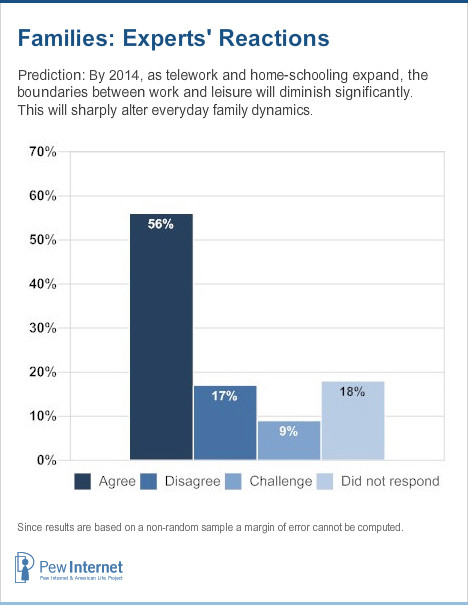
Note: An extended rundown of the written answers to this question can be found at: http://www.elon.edu/predictions/q15.aspx
Home broadband users and teenagers may represent leading indicators for what the future holds for the intersections of work, school, and home life. For example, internet users who have added a fast connection at home say they are more likely to telecommute. A home broadband connection also appears to make it easier for family members to share access to the computer and the internet.18 High school students see the internet as a virtual textbook and reference library, a virtual tutor and study shortcut, a place to conduct virtual study groups, a virtual locker, backpack and notebook, and as a virtual guidance counselor when they are deciding about careers and colleges.19
Since most of the respondents to this survey are elite “knowledge workers”20 with fast connections to the internet at home and at work, many shared personal stories about what a difference the internet has made in their own working lives.
One person wrote, “The increase in connectivity between mobile devices will result in a new family dynamic that will re-expand the notion of family to include not only geographically displaced extended family relatives but also unrelated family members. Around the clock connection and automatic sharing of contact information beyond the immediate family members will foster digital tribes and a stronger sense of ‘family.’”
Another expert wrote, “This prediction assumes that the boundary between work and leisure is a natural thing. On the contrary, it’s a new way of organizing. Moving back towards more integration will happen and is a good thing.”
“The Web is dramatically changing the way women in my generation are able to mother and work. The Web is providing the tool that women needed to contribute at home and in the world.”
– Tiffany Shlain, founder of the Webby Awards
Many respondents who offered up their personal experiences as proof were outshined by skeptics who, while in the minority, wrote convincing arguments to the contrary. One expert wrote, “I think it is naive to view the technology in isolation; family dynamics; economic and social considerations will trump this prediction – ten years is too fast to expect such change. Perhaps in two decades, but this extrapolation does not seem consistent with America’s past tech influences on lives.”
Another person wrote, “The potential exists, but the time saved by not commuting isn’t likely to be use to increase the work day. There is no evidence that kids living in dorms or boarding schools can’t separate class time from play time – even if they’re living within 100 yards of the classroom.”
“Whoever suggested that home-schooling would increase because of the internet has never stayed at home with a child. The Venn Diagram of telework and home-schooling shows two circles entirely without connection.”
– Moira K. Gunn, host of public broadcasting’s Tech Nation
Two respondents expressed doubt that all workers would benefit from telework options. One wrote, “I also remember when video conferencing was supposed to end the need for business travel. Sometimes there’s no substitute for being there.” Another pointed out that “nobody is going to make cappuccinos in Starbucks from home.”
Extreme communities
Prediction: Groups of zealots in politics, in religion, and in groups advocating violence will solidify, and their numbers will increase by 2014 as tight personal networks flourish online.
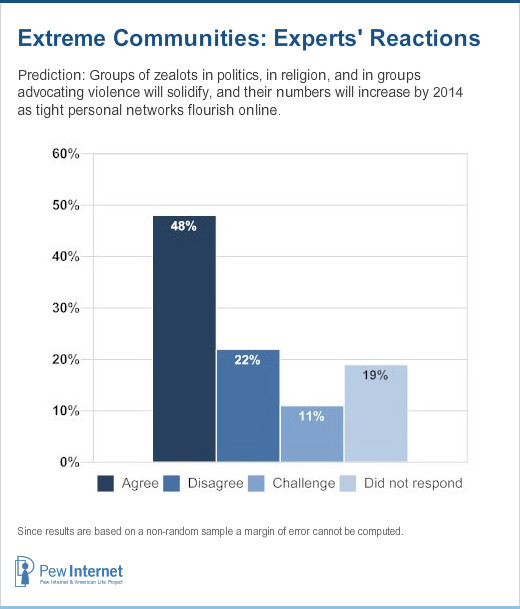
Note: An extended rundown of the written answers to this question can be found at: http://www.elon.edu/predictions/q16.aspx
Many respondents pointed out that the internet is like a pen, a microphone, or a telephone – all are wielded by good guys and bad guys. There is nothing inherent in the technology that gives advantage to one side or the others. Thus, many agreed that zealot groups will have an easier time sustaining themselves. By the same token, the experts are confident that all manner of helpful groups will have an equally easy time.
One expert wrote, “The internet is a medium not a motivator. It is possible however that the relative anonymity of the internet will allow people to voice notions that would not be tolerated in polite ‘arms-reach’ society, thus more vitriol could be expressed without fear of social opprobrium normally expected when meeting with others face to face. In this sense the internet is like graffiti, only it can be targeted to the right niche.”
A few experts criticized the sweeping nature of the prediction. For example, one expert wrote, “So far we have little empirical evidence to show that online communication has such adverse effects. (That is, it would be hard to show that the internet has had an isolated influence on bigoted actions among people who wouldn’t have otherwise gone down that path anyway.) The jury is still out on how much the Net fragments people into little communities of people who completely agree with them.” Fred Hapgood, a professional science and technology writer, had an even more pointed assessment: “These questions are very poorly formulated. Do you mean will the number of zealots increase or just the number of groups? I think the answer is no to the first and yes to the second.”
Another critic of the question gave it a more positive spin: “This is an interesting prediction. I tend to agree with it because the internet, having broken boundaries of geography and linear time, enables niche groups to reach a ‘critical mass’ much more quickly and conveniently than in previous generations. But of course the zealots are not limited to religion and politics – they also include the quilters and the Star Wars fans and the peaceniks. The internet itself is agnostic, and so should be your question.”
Susan Crawford, a law professor and policy fellow with the Center for Democracy & Technology, agreed, writing, “Although I think guilds will form, I’m not convinced that bad-guy guilds will be any more prevalent than good-guy guilds. People are generally nice to each other. Sure, like-minded people will find each other, but I don’t think that’s reason to adopt the negative language of this prediction. Yes, more groups will form. But this is a very diverse world, and there will be all kinds of groups.”
“Yes, but not only groups of zealots advocating violence. Also groups of ‘zealots’ advocating peace and non-violent activism.”
– Noshir Contractor, a researcher for the National Science Foundation
A small group of respondents suggested that the internet’s positive force will outweigh any negative inclinations among its users. Robert Lunn, a senior analyst for the USC Annenberg School’s Center for the Digital Future, wrote, “I believe that personal networks will allow some undesirable groups to enhance communications among themselves and perhaps to even broaden their recruitment efforts. However, I also believe that enhanced communications and access to information is on the evolutionary path to freedom.”
Politics
Prediction: By 2014, most people will use the internet in a way that filters out information that challenges their viewpoints on political and social issues. This will further polarize political discourse and make it difficult or impossible to develop meaningful consensus on public problems.
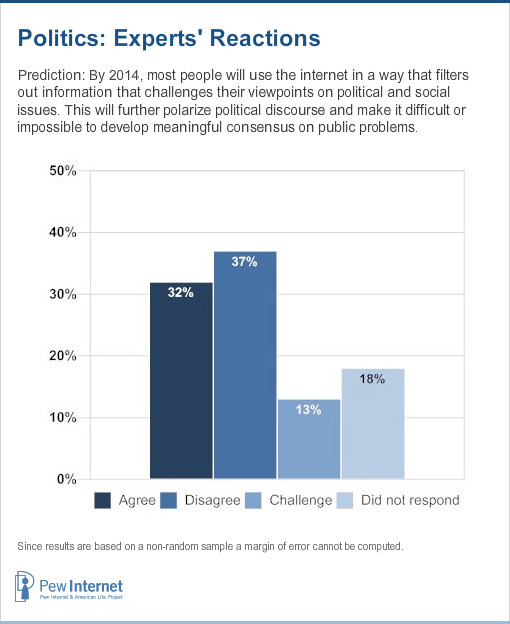
Note: An extended rundown of the written answers to this question can be found at: http://www.elon.edu/predictions/q17.aspx
An October 2004 report from the Pew Internet & American Life Project shows that even as political deliberation seems increasingly partisan and people may be tempted to ignore arguments at odds with their views, internet users are not insulating themselves in information echo chambers.21
“There will always be people who want to be challenged by opposing points of view, and as long as those points of view can still publish, the internet will make it more possible to access them with ease.”
– Noshir Contractor, a researcher for the National Science Foundation
Most experts disagreed with the prediction or challenged its premise, arguing that there are many other forces at work in political discourse. For example, Jorge Reina Schement, director of the Institute for Information Policy at Penn State University, wrote, “It is not the internet that drives polarization of the electorate. Rather, polarization stems from the inability to find common ground when values differ. Polarization in American society will continue; the internet will serve to abet this tendency.”
Another expert cited historical precedent, writing, “Most people use new media so they know what is important, what has happened and what may happen. The partisan press isn’t new – this nation was born out of a partisan press. And it certainly has been the norm in other parts of the world for many, many years. The bigger concern is the concentration of ownership by large corporations.” A third expert seemed to agree, writing, “There will always be people who want to be challenged by opposing points of view, and as long as those points of view can still publish, the internet will make it more possible to access them with ease.”
B. Keith Fulton, vice president for strategic alliances at Verizon Communications, wrote, “The ‘Net should have the opposite affect on ‘most people.’ Sure, crazy folk will find crazy folk. But the masses will use the ‘Net for their first news and will go to trusted sites for affirmation and/or information that they seek. The level of political discourse should rise in proportion to the penetration of the ‘Net and the availability of trusted sources.”
One expert grew tired of the predictions’ format and spoke for many when he wrote, “It’s very difficult to know how to answer these questions, since they are usually of the form, first A will happen and that will cause B, which will cause C. Suppose I think A and B will happen, but not C?? This question is just one example among many. Besides, what is ‘meaningful consensus’? Did we ever have a ‘meaningful consensus at any point during the 19th century, when there was no internet to speak of?”
Health system change
Prediction: In 10 years, the increasing use of online medical resources will yield substantial improvement in many of the pervasive problems now facing health care—including rising health care costs, poor customer service, the high prevalence of medical mistakes, malpractice concerns, and lack of access to medical care for many Americans.
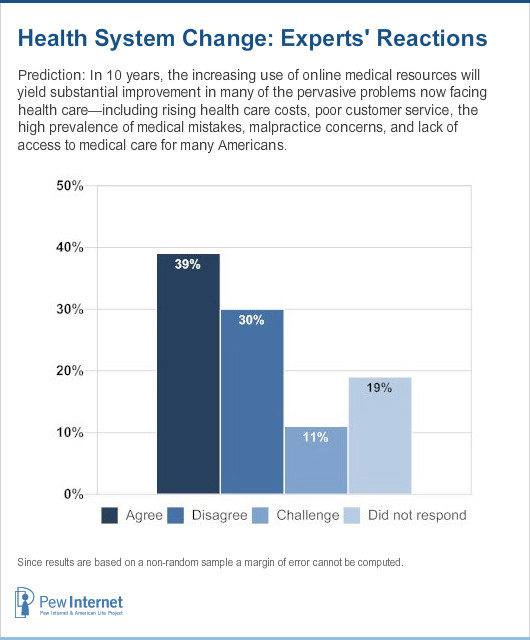
Note: An extended rundown of the written answers to this question can be found at: http://www.elon.edu/predictions/q18.aspx
A December 2002 Pew Internet & American Life Project survey showed that 80% of internet users, or about 102 million Americans, have searched online for at least one of 16 major health topics.22 An educated consumer stands a better chance of getting good treatment and the internet can be a significant resource for that health education process. An increase in the use of internet health resources is not a cure-all, however. For example, low health literacy limits many Americans’ ability to understand the information available online.
Many experts pointed out that the internet’s strengths (information, communication) will have little effect on the U.S. health system’s weaknesses (inequality of access to care, among others). Those who agreed with the prediction, however, were enthusiastic about the potential benefits of electronic medical records, remote monitoring of patients, and peer support.
Pamela Whitten, an associate professor at Michigan State University and a senior research fellow for Michigan State’s Institute of Healthcare Studies, wrote, “External barriers (such as legal/regulatory/reimbursement/organizational) still trump many efficiencies offered by the internet.”
One respondent wrote, “In fact, I think the increasing use of online resources will actually exacerbate most of these problems in the short term of the next decade, since medicine is still on the steep side of the adoption and learning curve in IT and use of the internet in particular. The costs of the IT investment required by HIPAA23 alone will add measurably to health insurance premiums, today and for at least the next five years. Part of the problem is that, even though IT and online improvements in these areas are likely to be beneficial to the very great majority of consumers, the potential cost of nagging problems or spectacular single failures is devastatingly high.”
“Online technology will only codify current health policy that fragments care and under-serves a significant minority of the American population. Real reform, including finance reform, is needed, which will result in cost-reduction, facilitated by online access.”
– Ted Eytan, medical director of the Web site for Group Health Cooperative
One expert wrote, “The rise in automation and self serve options (such as we see in self checkout lanes at supermarkets) is training our society not to rely on service from other human beings. My sense is that it is likely that patients will increasingly use the internet to act as their own doctor, coming to their physician with not only complaints but ‘solutions,’ the quality of which will be suspect.”
Another wrote, “Both the rising health care costs and its result, the lack of access to medical care, are the results of health becoming a source of profit for investors who already have money. Nothing inherent in the Web fixes that. Ditto for poor customer service. There is a potential gain in the widening of access to medical specialties for those who have the money – digital records, easy transmittal of test results and MRIs for second opinions or consultations,etc. – but the increasing corporate seizure of what had traditionally been a private, in-person matter between physician and patient also brings with it denial of benefits, and thus of services, that act as a counterweight to those benefits for far too many Americans, and world citizens.”
On a more optimistic note, one expert who works in health care wrote, “We are already finding the internet useful as a cheap way to distribute life-saving or promoting information and services to far-flung areas. Believe that there may be some (not a lot) of savings that can be put into other programs.” Gary Kreps, a professor at George Mason University and formerly the Chief of the Health Communication and Informatics Research Branch at the National Cancer Institute, wrote, “With increased access to relevant health information, better decisions will be made by health care consumers and providers.”
Many respondents wrote that they both agreed and disagreed with the statements (one complained that an “unreasonable connection” between two predictive statements was growing tiresome). For example, one expert wrote, “It will be very helpful, but not for the reasons listed above. The main advantage will be for peer support and information sharing.”
Personal entertainment
Prediction: By 2014, all media, including audio, video, print, and voice, will stream in and out of the home or office via the internet. Computers that coordinate and control video games, audio, and video will become the centerpiece of the living room and will link to networked devices around the household, replacing the television’s central place in the home.
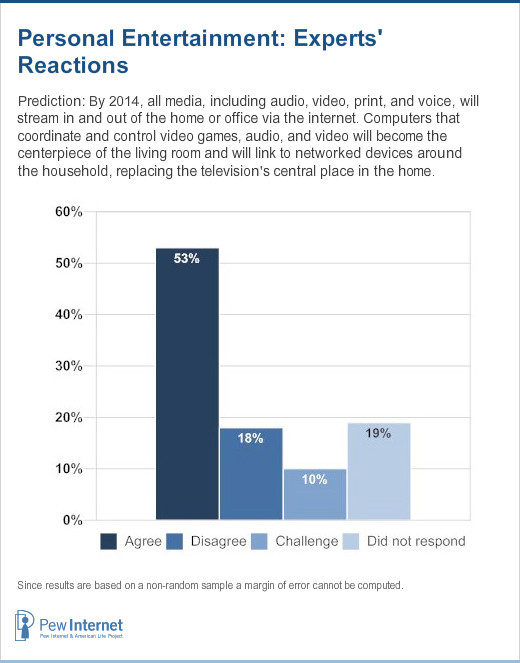
Note: An extended rundown of the written answers to this question can be found at: http://www.elon.edu/predictions/q19.aspx
Many experts believe that a media convergence is imminent, but most of those who agreed with the premise of the prediction added caveats and elaborations. A number of experts protested that all these media toys will be available, but only to an elite group.
One expert represented the most optimistic observers, writing, “The internet is becoming ‘data electricity’ and increasingly is the conduit by which information and entertainment enters the home and is enjoyed and shared with others inside and outside the home. This will probably happen before ’14.” Gary Bachula, a technology development leader, most recently at Internet2, also thought ten years was too long a timeline, unless the “digital rights management cops” put an end to the fun. He wrote, “Eventually, every thing digitized in the world (movies, music, books, newspapers, etc.) will be available from the network through peer-to-peer like networks. The net will become a giant TiVo, and will have every song, every movie, every TV show (from some point on), every sports game, every news broadcast, ever created. People will obtain it over the net – and send it within their homes wirelessly to devices that are hybrids of what we call computers and televisions today.”
James Brancheau, a vice president at GartnerG2 analyzing the media industry, wrote, “Media access won’t be exclusively through the internet; it will include many types of IP networks including private (e.g. cable, satellite) and public networks (e.g. datacasting, fixed wireless). TV will lose time share to the media PC and media appliances, but it will remain central to mainstream households. The tipping point away from TV will be further down the road, perhaps closer to 2020 when our 24-year olds turn 40.” Another expert echoed these ideas, writing, “I agree with the streaming and beaming of all media, but I do not agree that it will center on the new ‘hearth’ of the home. I believe media will be small, personalized, and wearable. We might connect to a display system periodically, but it is more likely to be impromptu small gatherings – decentralized use throughout the home.”
One detractor wrote, “Totally inconsistent with prior experience. Changes will be substantial but they will not affect all homes and new media or delivery ways will not replace old ones.”
“Functionality will be there, but full adoption will not.”
– Anonymous respondent
Tobey Dichter, founder of Generations on Line, also challenged the prediction, writing, “As with some of the other predictions, this presupposes an affluence that is not reality. Such broad-based connectivity requires costly subscriptions, tech know-how, housing flexibility and an interest in leisure activities beyond television – which are beyond the capacity for a vast number of Americans.” And B. Keith Fulton, vice president for strategic alliances at Verizon Communications, pointed out, “After a hard day’s work, most of us want to sit and watch or listen to our devices, not interact with them.”
Creativity
Prediction: Pervasive high-speed information networks will usher in an age of creativity in which people use the internet to collaborate with others and take advantage of digital libraries to make more music, art, and literature. A large body of independently-produced creative works will be freely circulated online and will command widespread attention from the public.
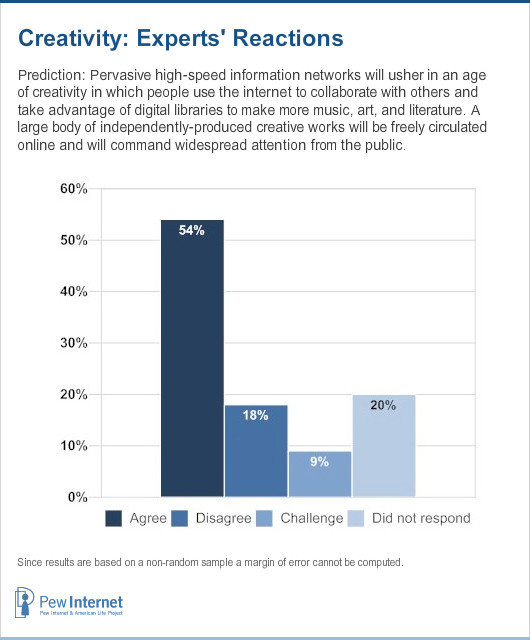
Note: An extended rundown of the written answers to this question can be found at: http://www.elon.edu/predictions/q20.aspx
According to a December 2004 report by the Pew Internet & American Life Project, artists and musicians have embraced the internet as a tool to improve how they make, market, and sell their creative works. They use the internet to gain inspiration, build community with fans and fellow artists, and pursue new commercial activity.24
“Predictions of a new age of creativity driven by the internet are no more likely to come to pass than similar predictions made in the early years of television.”
– Jorge Reina Schement, director of the Institute for Information Policy at Penn State University
Despite the upbeat feelings of artists themselves, many experts begged to disagree about the prospect for a flowering of creativity. The idea that independently-produced creative works will command widespread attention was almost universally derided as “utopian,” “pie-in-the-sky,” or simply “hype.” One respondent wrote, “Music, art, and literature. Yeah right. The only thing broadband will bring to the public is uncensored reality schlock shows and porn.” Another expert wrote, “Humanity has had books for hundreds of years, but does not have universal literacy. Creativity may bloom but that does not mean it will be seen or appreciated by all.”
One respondent wrote, “The internet overcomes the simple problem of disseminating information, but it vastly increases the problem of overcoming information clutter and overload. Marketing and publicity remain critical, whether provided by today’s record labels, by a completely altruistic co-op of like-minded artists, or anything in between.”
However, there were observers who believe that an “age of creativity” is possible. For example, one wrote, “Modern art was largely spurred by a reaction to photography. Artists adapt to new media, and will adapt to the internet.”
Internet connections
Prediction: By 2014, 90% of all Americans will go online from home via high-speed networks that are dramatically faster than today’s high-speed networks.
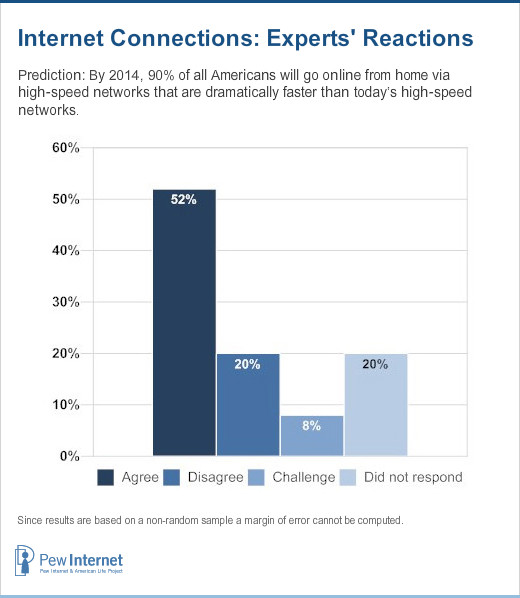
Note: An extended rundown of the written answers to this question can be found at: http://www.elon.edu/predictions/q21.aspx
According to the February 2004 survey of the Pew Internet & American Life Project, 34% of all adult Americans have access to broadband either at home or in the workplace. Much of the growth in broadband adoption at home is attributable to users’ unhappiness with the dial-up doldrums – that is, people growing frustrated with their slow dial-up connections. Price of service plays a relatively minor role in the home high-speed adoption decision.25
Although slightly more than half of experts agreed with this prediction, few were specific in their responses about why they think high-speed access will roll out to most homes by 2014. Many seemed to aspire to these heights of connection, citing more hopes than facts. As one expert wrote, “Yes, but 90% isn’t good enough. We must do away with the digital divide entirely if we are to become a truly advanced culture.”
More typical was the expert who wrote, “Whoa. First you have to get 90% online. I don’t think that is possible given current trends. I do believe broadband will be widely used, however. Still, will it be faster than today? Only if we can come up with novel ways to make that pay for itself.” Another wrote, “It will take longer to reach 90% unless this becomes a public-works project like the Interstate highways.” A third agreed, writing, “Only if the government subsidizes the great divide between the haves and the have-nots with respect to computers, computer training, and the cost of access.”




